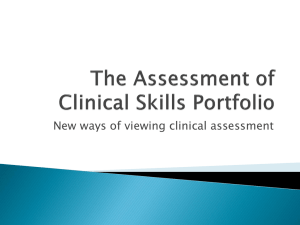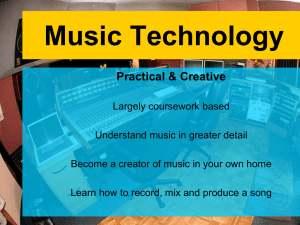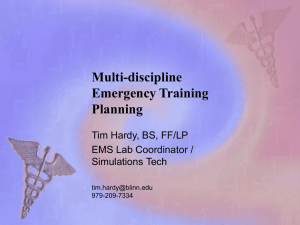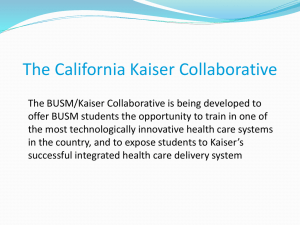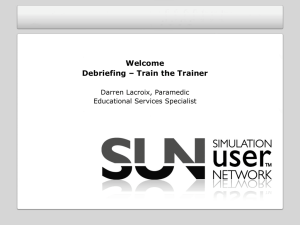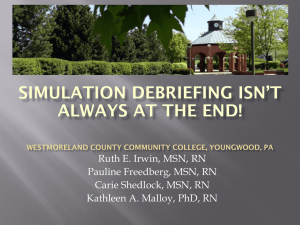Branding in the Digital Age
advertisement
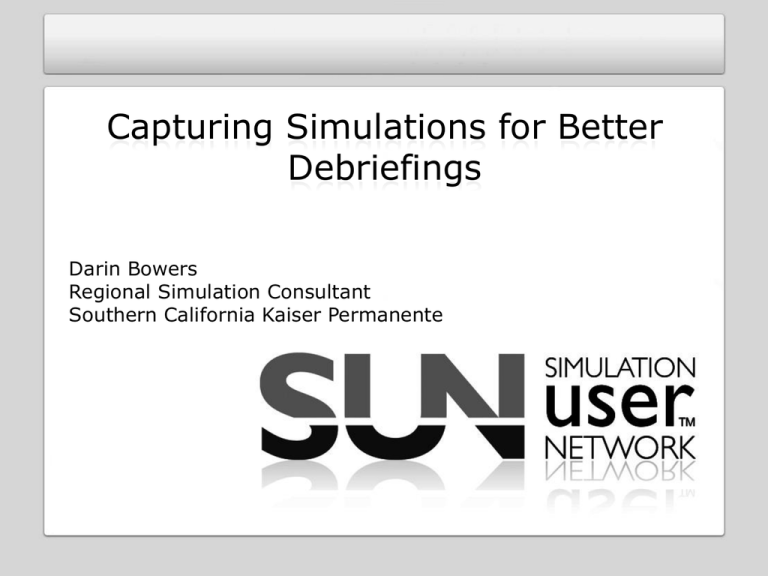
Capturing Simulations for Better Debriefings Darin Bowers Regional Simulation Consultant Southern California Kaiser Permanente Declaration: • Kaiser Permanente, southern California region • No other financial interests • Each SCAL Kaiser Permanente hospital owns Laerdal, Gaumard, and Blue Phantom simulators • SCAL Kaiser Permanente uses the Laerdal Debriefing Software and Studiocode software Learning Objectives: • Discuss benefits of using video in debriefing • Discuss confidentiality and consent issues related to video recording simulation performances • Record a simulation using the simulator’s web camera • Access and view the debriefing file using the debrief viewer • Save and distribute the debriefing video • Add comments to the debriefing video Background: • 4 years U.S. Army medic and National Registry EMT-B o Mega simulation (i.e., beans, bullets and bandages) • B.A. and M.A. in Anthropology (Historical Archaeology) • 8 years audio/visual and computer support o CompTIA A+ Certification (IT Technician) o Extron Certified A/V Associate • 2 years simulation technician at Cal State Fullerton • 2 ½ years simulation coordinator/consultant at Kaiser Permanente oACLS Why do we Simulate? PowerPoint Presentations are Boring • “Last week I gave a fire safety talk and nobody paid any attention. It’s my own fault for using PowerPoint. PowerPoint is boring.” PowerPoint Presentations are Ineffective Simulation Kaiser Permanente Focus for Simulation • Teamwork and Communication • Majority of errors are related to communication • Whole team participates (MD, RN, ED techs, etc…) • System issues • e.g., wrong IV tubing for pump • Low frequency, high stress events • Pediatric codes Why do we Record Simulations? Why we Record Debriefings? “Many consider debriefing to be the most important component of simulation based education. One could use a static mannequin without all the bells and whistles and achieve profound success…by virtue of the skill, dedication and techniques of the debriefing instructor only. The instructor is the centerpiece of the endeavor.” Mort and Donahue, 2004 Why we Record Simulations? • Perceived performance vs. actual performance • Watching performance from the outside • Golf swing • Throwing the ET tube • Three components of cultural behavior • Concrete and indisputable • Clearly illustrate “anchor” events • Time to shockable rhythms, identification of shockable rhythm, decision to shock, etc… Confidentiality and Consent Issues Confidentiality and Consent Issues Related to Video Recording • All video/audio is erased after training session ends • Precedence has been set from legal action • Announce before training that recording will occur • Visibly erase recordings after training session • Scrub hard drives Confidentiality and Consent Issues Related to Video Recording Video recording without audio is typically legal without consent • • Except changing room, showers, etc… • Video recording with audio is almost always illegal without consent Confidentiality and Consent Issues Related to Video Recording • One Party-Consent • Only one participant has to consent to recording • e.g., Manager recording employees conversation • Two Party-Consent • All parties have to consent to recording • Once informed if they continue talking, consent is implied Let’s Record a Simulation! Pearls of Wisdom • Audio is most important, video is secondary • Focal point of action is the participants, not the manikin • Show segments of video with brief introduction • Comments are added when you click enter… type fast • Flash drives, CD-ROMs, and DVDs are not adequate for long term storage… use a hard drive Pearls of Wisdom • Properly dispose of debriefings • Deleting a file from a computer does not erase it from the hard drive… scrub scrub scrub • Ensure that videos are only used/distributed in accordance with your signed consent form Questions?



